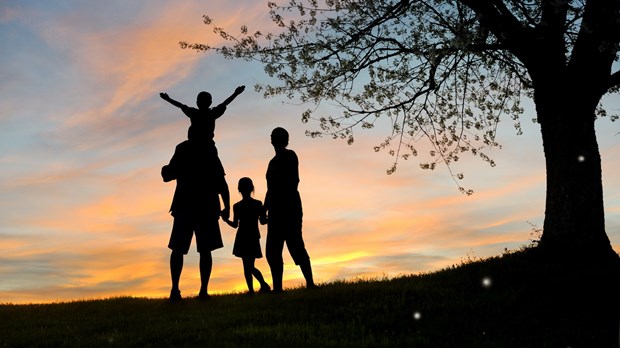Loving Up Close

Shondra was 21 years old with a 1-year-old daughter when she moved across state lines to escape abuse from her child’s father. She had no high school diploma, driver’s license, marketable skills, or family support. The meager wages she earned at a fast-food restaurant went mostly to child care until she eventually lost her job. For a year, she and her daughter shuttled from one homeless shelter to another.
Homeless, jobless, and with no apparent future for her or her daughter—this is a mother with limited options. This is a child at serious risk of being removed from her family. Can anything be done to keep them together?
James 2:14–16 challenges us as we consider at Shondra and other families like hers: “Suppose you see a brother or sister who has no food or clothing, and you say, ‘Good-bye and have a good day; stay warm and eat well’—but then you don’t give that person any food or clothing. What good does that do?” James poses a piercing question: “Can that kind of faith save anyone?”
Asking Better Questions
Bringing families together and keeping families together are two pillars of Bethany Christian Services’ work across the U.S. and around the world. Many know Bethany for our services that bring families together through adoption. We got our start in 1944 as a home for orphaned children. Over the years, Bethany began casting a wider net in our desire to “care for orphans . . . in their distress” (James 1:27). The “genuine religion” that verse describes encompasses not only the orphan but also the birth, adoptive, and foster families in that orphan’s life. It compels us to take a hard look at systems that leave families like Shondra’s vulnerable—resulting in more than one million abortions annually in the U.S., 400,000 children currently in foster care, and 151 million orphans worldwide.
James’ definition of “genuine religion” challenges us to ask better questions. What if we worked to prevent problems like these instead of simply managing them? What if women and men facing unplanned pregnancies had resources, support, and real hope? What if we could help parents in crisis by safely caring for their children before involving Child Protective Services? What if keeping families together was an essential part of the solution to the global orphan crisis? Asking questions like these is where real change begins.
Love that Answers
Consider these three examples of how we’re striving to live out answers to these and make a real difference for families.
Facing a Crisis Pregnancy
Maggie was 17, pregnant, and had been kicked out of her family’s home. She was “crashing” on her friend’s sofa, but she needed a more permanent living solution as well as prenatal care and basic necessities. Not only was she holding her jeans together with safety pins, she didn’t have a winter coat that fit around her expanding figure. Maggie was clearly at risk of seeking an abortion. How can we present her with a viable alternative to abortion?
Bethany’s first goal in working with an expectant mother like Maggie is to give her support and information so she can make a well-informed decision about the outcome of her pregnancy. The decision is hers; our role is to ensure that she knows she has options. Yes, we can help her find the adoptive family she wants for her child, but if she decides to parent her child, we can help her weave a support net so she has what she needs to succeed. Our Life Impact Fund is part of that net. It provides financial assistance for basic needs like groceries, gas, clothing, utilities—the kind of real help that can make an unplanned pregnancy less stressful and help a mother choose life for her child.
Crushed by Poverty
James was desperate. This father in Zambia had five children to care for, including newborn twins. Their mother was blind and partially paralyzed. James was only able to work odd jobs while providing care for his wife. He considered sending the babies to an orphanage. This is a family at risk of being separated. How can we keep this family together?
Through Bethany’s One Family sponsorship, James received help with the family’s basic needs—including milk and medicine for the children. James had been given a peanut grinder to make peanut butter, but it was useless without the money to buy the nuts. Through sponsorship, he was able to purchase peanuts and jumpstart a home business. He soon found a shop that would sell his product allowing him to make a living from home while providing for his wife and all of their children.
Homeless and Jobless
Remember Shondra and her daughter, living homeless and unemployed? How can we keep them together?
Shondra turned to Bethany’s Safe Families for ChildrenTM (SFFC) ministry. Shondra’s SFFC coach connected her with a local host family willing to care for her daughter in their home while Shondra got back on her feet. SFFC is not foster care, although the host family did complete a rigorous background check. Shondra was in complete control from start to finish and retained full legal custody of her daughter at all times. In 30 days, while her daughter was safely cared for, Shondra worked an aggressive plan. With funds she received from an income tax return, she found an apartment, enrolled in school, obtained child care so she could attend classes, and jumpstarted her own in-home child care service. She has since obtained her GED and a driver’s license. She found a job as a certified nursing assistant and enrolled in college. She and her daughter are on a path to a stable, more hopeful future.
Loving Our Neighbors
Real stories like these are repeated through Bethany programs worldwide—hurting people, at their most vulnerable, making life-altering decisions about their lives, their families, and their futures. While Bethany can provide counseling, resources, training, and support, we need your help—because real crises like Maggie, James, and Shondra faced are likely happening right now in your community.
Jesus showed us that the way to love others is up close—he touched the untouchable and ate with outcasts. He brought hope to the hopeless and healing to the sick. Indeed, he “became human and made his home among us” (John 1:14). This same Jesus asks you to “love your neighbor as yourself” (Mark 12:31) and to love others “in the same way I have loved you” (John 15:12).
Could you love a mother facing an unplanned pregnancy that way? Could your family love a struggling family in Albania, Zambia, Guatemala, or elsewhere in the world that way? Could you advocate at your church for orphaned children with special needs? Could you volunteer at a crisis pregnancy center or at a local Bethany branch? Could your family become a Safe Family for Children? Could you encourage a family on the brink with a homemade meal or a few hours of child care? Could you give financial help to a family that’s considering adoption? Could you commit to pray daily for a child in foster care?
It’s true that we demonstrate Christ’s love by caring for widows and orphans in their distress, but we do the same when we care for expectant mothers, families in crisis, couples facing infertility and pregnancy loss, teens aging out of foster care, and thousands of children waiting for families.
As Christ-followers, we worship a God who makes all things new. He has made us in his image to be people of reconciliation, redemption, and restoration in a broken world. “Genuine religion” brings families together, keeps families together, and has the power to end the global orphan crisis. This is the kind of faith that saves lives.
All names have been changed to protect the privacy of the individuals. Learn more about Bethany Christian Services’ mission, programs, and locations at Bethany.org.
Carol Lee is Publications Manager at Bethany Christian Services.
Read more articles that highlight writing by Christian women at ChristianityToday.com/Women
 Read These Next
Read These Next
 Stop Parenting According to Popular OpinionWhy popular opinion, social media, and online advice can derail parents
Stop Parenting According to Popular OpinionWhy popular opinion, social media, and online advice can derail parents
 Cancer May Take My Life, But It Can Never Take My HopeChoosing mundane faithfulness in the face of a terminal illness
Cancer May Take My Life, But It Can Never Take My HopeChoosing mundane faithfulness in the face of a terminal illness








 Homepage
Homepage